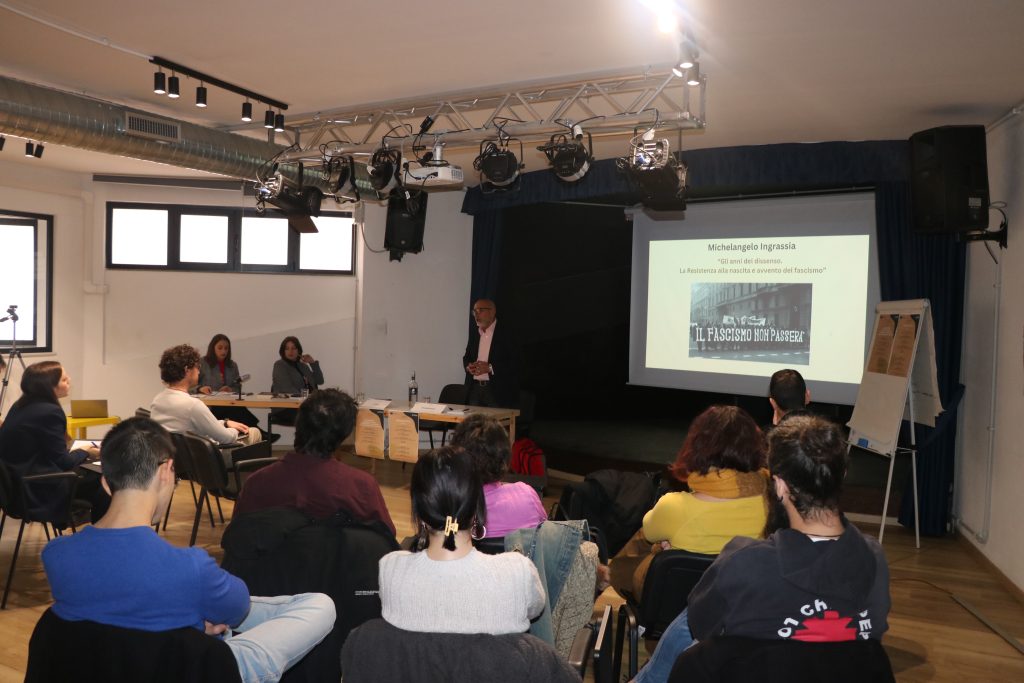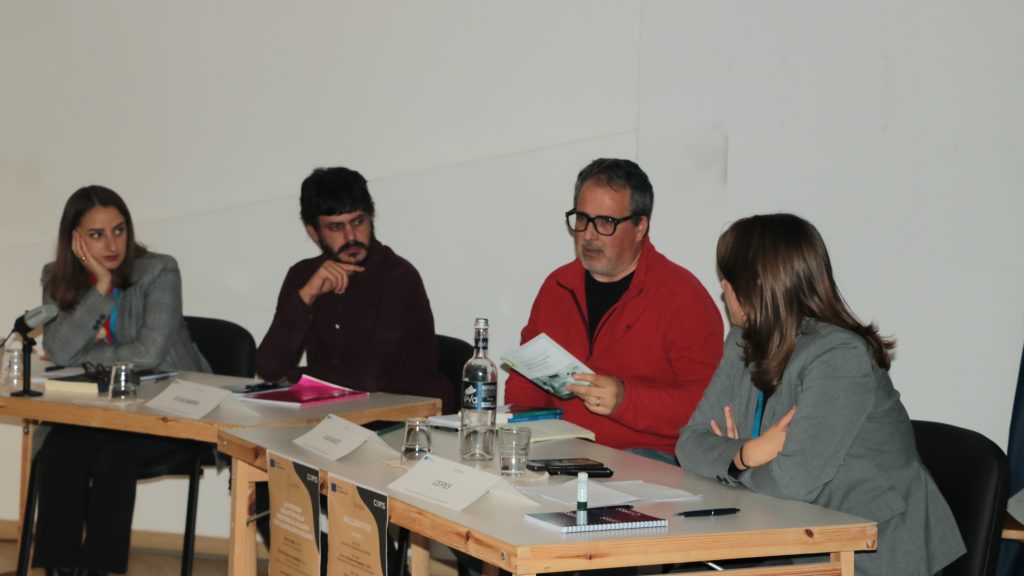Overview
CEIPES ETS implements the Memory today I and II workshop, named “Conference on collective memory of the Resistance to fascism and of Italian colonialism”, envisaged in the WP2, activity 2.4, on the 27th of November 2023. The event took place at Ceipes ETS office in Palermo, Via Francesco Maria Alias, 20. It started at 11.00 and lasted until 15.00.
The memory today I and II gives the opportunity to present the first two researches of the SOLREM project and to host experts to share insights related to the topics. The main objective of the Memory Today I and II Workshops was to disseminate the findings from the initial two reports of the SolRem project. These reports focused on (1) attitudes towards the collective memory of resistance against far-right regimes, groups, or practices and specific narratives, and (2) collective memory practices related to the right-wing. The workshops featured presentations on collective memories concerning far-right political movements in the project’s partner countries: Portugal, Romania, Finland, Italy, and Spain.


Approximately 20 individuals participated in the audience, actively engaging in discussions and debates on countering far-right movements. The workshops effectively achieved their goal of sharing the outcomes of the earlier reports conducted in the year, shedding light on the history of far-right movements in each country.
Thus, the conference was held in two sessions.
In the first one, Francesca Morganella, the project manager of the project, presents the two reports: Report attitudes towards the collective memory of resistance against far-right regimes, groups or practices and specific narratives in collective memory; and Report on collective memory practices concerning the right-wing, political movements in the project’s partner countries: Portugal, Romania, Finland, Italy, and Spain.
She made an introduction on collective memory and its role and its use in political debate, specifically for the Resistance to authoritarianism and colonialism.

Then the Professor Carlo Verri, a historian from University of Palermo, speaked about the resistance of Sicilians under fascism; together with other experts in contemporary history, he wrote a book, published in 2019 by the Sellerio, “I siciliani nella Resistenza” (Sicilians in the Resistance), edited by him and Tommaso Baris, another professor of contemporary history at the University of Palermo. During his presentation, he had the opportunity to talk about his historical research, in which he dealt with the role of Sicilians and southerners in general during the resistance to fascism.
It is important to emphasise that the Italian Resistance was not fought in Sicily, but in northern Italy, which created the idea that the Resistance was fought by people from northern Italy. His research contributes to dispelling this myth, bringing many examples of Sicilian partisans, examples of women’s civil resistance from the south. Furthermore, the difficulty in finding the stories of partisans from the South of Italy lies in the fact that southerners often later settled in the north, then did not come back to Sicily; and for those who returned, it was not common practice to recount their resistance experiences. An interesting aspect that Verri points out is that people from southern Italy who had the opportunity in the years 1943-45 to choose whether to join fascism or the Resistance many joined the Resistance, and being far from home, they felt they had little to lose, this meant that their adherence was even more radicalised than that of northerners.
Later, his collegue, Professor Michelangelo Ingrassia dealt with forms of Resistance at the beginning of fascism and after its instalments at the governement. He made many historical references that refer to the resistance during the rise of fascism and during the regime itself, before the Resistance we are used to talk about took place.
This Resistance was not combatant in the conventional sense, but in parliament, of left-wing politicians who tried to oppose it, aware of its political project. On the other hand, he emphasised that the rise of fascism was not an error of evaluation on the part of those who supported it, but a project that evolved as it intended.
Therefore, the second session started with an introduction made by Alessia Gambino, project manager of CEIPES ETS about demystification of the myths of fascism and Italian colonialism. The most common one is the reference to “italiani brava gente” (the Italian good people), the myth is based on the fact that the italian colonialism was shorter, compared to the french or british ones, less efficient and successful.

History, however, helps to dispel these myths one by one, tracing the beginning of Italian colonialism to after the unification of Italy, in the 1860s, and although it was unsuccessful, this does not make it any less violent, also documenting the use of chemical gases and illegal torture during the harsh colonial campaigns.
Then two experts of the University of Palermo gave their contribution. Professor Antonino Blando made a reflection on imperialism and nationalism.
Imperialism ambitions required the Italian country to search for territories beyond the sea, the Mediterranean one in the case of Libya and also near the Suez Canal, for Eritrea, Ethiopia and Somalia. The ambitions of imperialism together with economic purposes drove Italian colonialism, another important key factor to consider, that unites the whole European countries imperialism, is the superiority of these countries, the idea that they should govern inferior people, such as African people, who according to the reported documents have similar common characteristics: darker, dirtier, devoid of government structure and state mentality.
Lastly , PhD Riccardo Caldarera, an expert in sociology and gender studies, speaked about masculinity and violence, with a highlight on gender violence.
Violence is the basic endemic coordinate of colonialism. It is practised against subjugated peoples in Africa and in particular against female bodies. Women were enslaved by the colonists, for domestic needs and sexual exploitation. Not only history itself but also historiography speaks of peoples from the European countries “penetrating virgin lands”, these common expressions embedded a clear violent patriarchal language of which people are often unaware.
The fil rouge of the speeches was the collective memory and the narratives on a part of Italian history which is not often present in the public debate. The audience was very much engaged in the discussions and eager to better understand our history, analysed from unusual points of view and therefore to become aware of the different stories.
